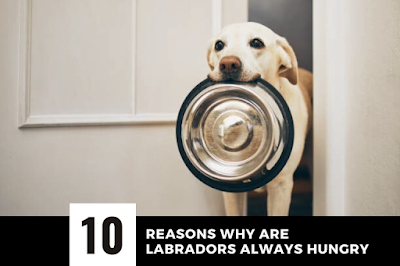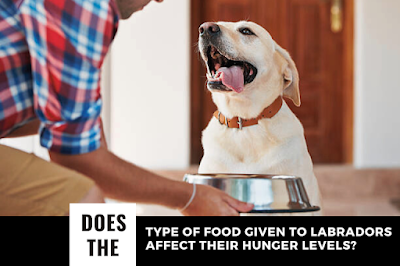10 Reasons Why Are Labradors Always Hungry - Dogvisible
If you're a proud owner of a Labrador, you know that their love for food is unmatched. From begging for scraps at the dinner table to scavenging for food in the trash can, Labradors are notorious for their never-ending appetite.
In this post, we'll explore the reasons why are Labradors always hungry, the risks associated with overeating, and provide tips for managing their hunger and preventing health issues.
WHAT YOU LEARN HERE -
- Why Are Labradors Always Hungry?
- 10 Reasons Why Are Labradors Always Hungry
- Does The Type Of Food Given To Labradors Affect Their Hunger Levels?
- Can Hunger In Labradors Be A Sign Of Underlying Health Issues?
- How Can Owners Manage Their Labrador's Hunger?
- Summary
Whether you're a new Labrador owner or have been living with these lovable gluttons for years, this post will provide valuable insights into your pet's eating habits. So, let's dive in and learn why Labradors are always on the hunt for their next meal!
Why Are Labradors Always Hungry?
Labradors are known for their loving and affectionate personalities, but they are also well-known for their voracious appetite. Labradors are always hungry, and their insatiable hunger can often lead to overeating and weight gain. This trait is so common in labradors that it has become a characteristic of the breed.
While labradors have a reputation for being gluttons, there are several reasons why they are always hungry. Understanding the causes of a labrador's constant hunger can help owners manage their pet's diet and prevent health issues such as obesity and diabetes.
10 Reasons Why Are Labradors Always Hungry
Sure, here are ten reasons why Labradors are always hungry in detail -
1. Due to Their Genetics
One of the reasons why Labradors are always hungry is due to their genetics. Labradors have been selectively bred over generations to be hunting dogs that can work tirelessly for hours, sometimes days, at a time. As a result, they have a high metabolism and require a lot of energy, which translates into a constant desire for food.
2. Overfeeding them
Many Labrador owners may unknowingly contribute to their pet's constant hunger by overfeeding them. Labradors have a reputation for being gluttons and will eat whatever food is put in front of them. However, overfeeding can lead to obesity and other health issues, so it's important to feed them the right amount of food.
3. Not regular Exercise
Labradors are energetic dogs that require regular exercise to maintain their health and well-being. However, exercise also increases their metabolism, which can make them feel hungrier than usual. Therefore, if your Labrador is particularly active, they may need more food to keep up with their energy levels.
4. Breed Size
Labradors are a larger breed of dog, and therefore, they require more food to sustain their body weight. Additionally, larger dogs tend to have larger appetites, which can contribute to their constant hunger.
5. Out of Boredom
If Labradors don't have enough mental and physical stimulation, they may resort to eating out of boredom. Providing them with toys, puzzles, and other activities can help prevent boredom eating and keep them satiated.
6. Certain Health Issues
Certain health issues, such as hypothyroidism and diabetes, can cause a dog's appetite to increase. If your Labrador's hunger seems excessive or out of the ordinary, it's important to consult a veterinarian to rule out any underlying health problems.
7. Low Food Quality
The type of food you feed your Labrador can also impact their hunger levels. Feeding them low-quality, nutrient-deficient food can leave them feeling unsatisfied and hungry, leading to overeating. Providing them with high-quality, nutrient-dense food can help keep them fuller for longer periods.
8. Environmental Factors
External factors such as temperature and weather conditions can also affect a Labrador's hunger levels. During colder months, Labradors may require more food to maintain their body temperature.
9. Age of labs
As Labradors age, their metabolism may slow down, making them more prone to weight gain. However, their appetite may remain the same, leading to overeating and other health issues.
10. Lack of Training
Labradors are highly intelligent dogs that can be trained to exhibit positive behaviors, including eating habits. Training them to eat at specific times and in certain locations can help manage their hunger and prevent overeating.
Does The Type Of Food Given To Labradors Affect Their Hunger Levels?
Yes, the type of food given to Labradors can affect their hunger levels.
Feeding your Labrador low-quality, nutrient-deficient food can leave them feeling unsatisfied and hungry, leading to overeating. Conversely, providing them with high-quality, nutrient-dense food can help keep them fuller for longer periods, reducing their hunger levels.
Labradors are known to have a high metabolism, and their food should contain an adequate amount of protein, fiber, and healthy fats to sustain their energy levels. A diet that is high in carbohydrates and low in protein and fiber can lead to an increase in hunger levels.
It's also essential to consider the calorie content of the food you are feeding your Labrador. Overfeeding can contribute to obesity and other health issues. Therefore, it's important to feed them the right amount of food based on their age, weight, and activity level.
Consulting with a veterinarian or a professional pet nutritionist can help you determine the best type of food for your Labrador based on their unique needs and preferences. Ultimately, providing your Labrador with a high-quality, nutrient-dense diet can help manage their hunger levels and maintain their overall health and well-being.
Can Hunger In Labradors Be A Sign Of Underlying Health Issues?
Yes, hunger in Labradors can be a sign of underlying health issues. While Labradors are known for their love of food and their high metabolism, excessive or sudden increases in appetite can indicate an underlying health problem.
For instance, certain health issues such as hypothyroidism and diabetes can cause a dog's appetite to increase. These conditions can affect the dog's metabolism and cause their body to crave more food than necessary. Similarly, gastrointestinal problems such as inflammatory bowel disease or malabsorption can also cause a dog to feel constantly hungry, as their body may not be able to absorb nutrients properly.
Other symptoms that may accompany increased hunger include weight loss or gain, excessive thirst, increased urination, lethargy, vomiting, and diarrhea. If your Labrador displays any of these symptoms or exhibits excessive or unusual hunger, it's essential to consult with a veterinarian.
A veterinarian can perform a physical exam, run tests, and diagnose any underlying health issues that may be causing the excessive hunger. Early detection and treatment can help manage the condition and prevent further health complications.
How Can Owners Manage Their Labrador's Hunger?
Managing a Labrador's hunger is an essential part of their overall health and well-being. Here are some ways that owners can manage their Labrador's hunger:
- Feed a high-quality, nutrient-dense diet - Providing your Labrador with high-quality, nutrient-dense food can help keep them feeling fuller for longer periods, reducing their hunger levels. Make sure to feed them food that is appropriate for their age, weight, and activity level.
- Stick to a feeding schedule - Establishing a feeding schedule can help regulate your Labrador's hunger levels. Feeding them at the same time each day can also help them develop a routine and reduce their anxiety.
- Avoid overfeeding - Overfeeding can contribute to obesity and other health issues. Make sure to measure your Labrador's food and provide them with the appropriate amount based on their age, weight, and activity level.
- Provide healthy snacks - Treats and snacks can be a part of your Labrador's diet, but make sure they are healthy and nutritious. Avoid giving them too many high-calorie treats or snacks that are low in nutrients.
- Engage in regular exercise - Regular exercise can help regulate your Labrador's metabolism and reduce their hunger levels. Aim to provide them with at least 30 minutes of physical activity each day.
- Consult with a veterinarian or a professional pet nutritionist - Consulting with a veterinarian or a professional pet nutritionist can help you determine the best type of food for your Labrador based on their unique needs and preferences.
By following these tips, you can help manage your Labrador's hunger levels and maintain their overall health and well-being.
SUMMARY
As we've seen, a Labrador's constant hunger might have a variety of causes. Does your pet fit the bill? If so, they might carry a POMC gene with a defect.
This implies that they lack the biological capacity to recognise when they are full. Regardless of the cause of your Lab's constant about why are Labradors always hungry hunger, it is your duty as a pet owner to make sure your dog maintains a healthy weight.








